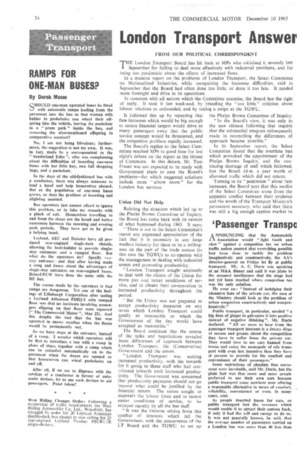'Passenger Transpc
Page 36

If you've noticed an error in this article please click here to report it so we can fix it.
ANNOUNCING that the Automobile Association would "fight tooth and claw" against a congestion tax on urban traffic unless assured that everything possible had been done to tackle the problem imaginatively and constructively, the AA's director-general on Friday let fly at public transport. Mr. A. C. Dune was speaking at an MAA dinner and said it was plain to the meanest intelligence that the stage had not yet been reached where congestion tax was the only solution.
He went on : "Instead of indulging their obsessive hate of the private car, the men at the Ministry should look at the problem of urban congestion constructively and comprehensively."
Public transport, in particular, needed "a big dose of ginger to galvanize it into positive instead of negative thinking ", Mr. Mule declared. "All we seem to hear from the passenger transport interests is a dreary dirge of moans and groans about the competition they have to suffer from the private car. They would love to see cars banned from towns 'and enjoy the monopoly of city transport with even less incentive than they have at present to provide for the comfort and convenience of their passengers."
Some restrictions of absolute free movement were inevitable, said Mr. Dude, but the plain fact was that more and more people preferred to use their own cars because public transport came nowhere near offering a reasonable alternative in terms of comfort, reliability, convenience or even, in many cases, cost.
As people deserted buses for cars, so public transport lost the revenues which would enable it to attract their custom back, II only it had the will and enemy to do so. It was not generally known, he said, that the average number of passengers carried on a London bus was more than 40 !um than




























































































































